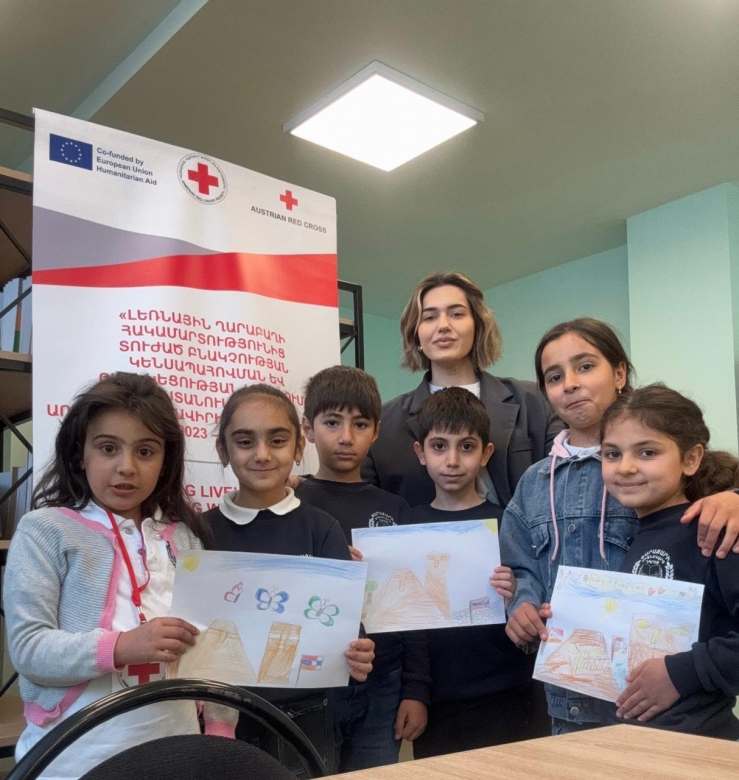
In the autumn of 2020, life changed in an instant for thousands of families in Nagorno-Karabakh. A brutal 44-day war broke out between Azerbaijan and Nagorno-Karabakh, forcing thousands to flee their homes. For children, it meant losing not only their homes but also the safety and innocence of early childhood. Nare was only three years old when her family escaped to Armenia in search of safety. After some time, they returned home, hoping for stability.
By 2023, when Nare was six, her family was uprooted once again. This time, they left everything behind and joined more than 100,000 people resettling in Armenia’s Armavir region.
At her new school in Parakar, Nare barely spoke. She didn’t play, often seeming distant and tense, avoided eye contact and flinched at loud sounds. Nare wasn’t just quiet — she was a child carrying an invisible weight of war.
Creating a Safe Place
Helping Nare didn’t start with therapy sessions or questions. It started with something much simpler: Trust. Within the RENEW project funded by European Union Humanitarian Aid, the Armenian Red Cross Society offered psychosocial assistance to children like Nare.
Her psychologist introduced crayons, storybooks, and toys — tools that gave Nare the freedom to express what words could not. At first, she remained silent. Slowly, she drew. She smiled. She asked questions. She started trusting. Each of these was a tiny doorway opening toward healing.
The RENEW project provides displaced children and their families with psychosocial support through group and individual counseling, creative activities, and safe spaces, helping children like Nare and their families to heal, build resilience, and regain stability in their lives.
Listening Between the Silences
There were no sudden breakthroughs — just gentle, steady progress. Nare’s drawings, once dark and hesitant, began to show color and movement. Her silence, once heavy with fear, began to feel thoughtful.
Then came a quiet laugh. A small moment, but a clear sign of change.
She started joining games, speaking to her teacher, and making eye contact — simple actions that reflected something bigger: she was beginning to feel safe.
Visible Progress
Over time, the transformation became undeniable. What started as cautious steps turned into steady progress. With consistent support, Nare began to reconnect with the world around her:
✔ Her emotional tension eased.
✔ She became calmer, more emotionally balanced.
✔ Fear and anxiety faded into confidence and joy.
✔ She could focus and regulate her emotions.
✔ Her ability to connect with others grew stronger.
✔ Most importantly, a trusting, supportive relationship was built.
These weren’t just changes on the outside. They reflected deeper emotional recovery.
She didn’t simply move past the trauma — she rediscovered what it means to be a child: To play, to connect, and to grow in a space where healing is possible.
Every Silence Holds a Story
There are many children like Nare — quiet not because they have nothing to say, but because their experiences weigh too heavily. In many cases, silence is a form of protection. But with time, consistency, and trust, that silence can change.
Nare’s progress shows that healing doesn’t have to be fast — it just has to be supported. Because behind every silence is a story. And with the right support, those stories can shift from survival to building a stronger future.
The RENEW project implemented with the support of European Union Humanitarian Aid aims to improve the living conditions and psychosocial well-being of 16,020 women, men, girls, and boys displaced by the Nagorno-Karabakh conflict, which escalated in 2023 and led to a massive influx of over 100,000 individuals seeking refuge in Armenia. Implemented in the regions of Ararat, Armavir, and Kotayk, the project focuses on supporting displaced persons in rebuilding their lives and fostering stability and resilience within their new communities.